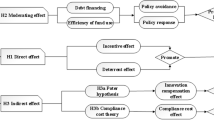Abstract
This study explores the differences in pollution control performance of industries with different types of ownership – State owned (SOE), collectively or community owned (COE), and privately owned (POE). A theoretic analysis is conducted and followed by an empirical assessment with Chinese data. The empirical results show that the COEs in China have better environmental performances in water pollution discharges than the SOEs and the POEs, suggesting that COEs may internalize environmental externalities.
Similar content being viewed by others
References
Anderson D. (1995). Mining, Privatization and the Environment. Journal of Mineral Policy 11(3): 25–28
Baumol W. J. and Oates W. E. (1988). The Theory of Environmental Policy. Combridge University Press, New York
Copeland B. R. and Taylor M. S. (2003). Trade and the Environment: Theory and Evidence. Princeton University Press, Princeton and Oxford, 304 pp
Dasgupta S., Laplante B., Mamingi N. and Wang H. (2001). Inspections, Pollution Prices, and Environmental Performance: Evidence from China. Ecological Economics 36:487–498
Dean, J. (1992), Trade and Environment: A Survey of Literature. Policy Research Working Paper, World Development Report No. 966. Washington D.C.: The World Bank.
Eiser, J. R., S. D. Reicher and T. J. Podpadec (1996), `Attitudes to Privatization of UK Public Utilities: Anticipating Industrial Practice and Environmental Effects' Journal of Consumer Policy 19(2), 193–208
Kikeri S., Nellis J. and Shirley M. (1992). Privatization: The Lesson of Experience. The World Bank, Washington, D.C.
Low P. and A. Yeats (1992), Do Dirty Industries Migrate?, in P. Low, ed., International Trade and the Environment. Discussion Paper 159. Washington D.C.: The World Bank.
Kalt J. (1988). The Impact of Domestic Environmental Regulatory Policies on US International Competitiveness. In: A. M. Spence and H. A. Hazard, eds., International Competitiveness. Harper and Row, Ballinger, Cambridge, MA
Pargal S. and Wheeler D. (1996). Informal Regulation of Industrial Pollution in Developing Countries: Evidence from Indonesia. Journal of Political Economy 106(6):1314–1327
Schmid A. and Robin D. K. (1995). Focus on Environment: Brazil Emerges as Latin American’s New Environmental Hotspot. ENR 234(21):42–43
Sinkule B. J. and L. Ortolano (1995), Implementing Environmental Policy in China. Westport, Conn.: Praeger.
Talukdar D. and C. Meisner (2001). Does the Private Sector Help or Hurt the Environment? Evidence form Carbon Dioxide Pollution in Developing Countries. World Development 29(5):827–840
Xing, Y. and C. Kolstad (1998), Do Lax Environmental Regulations Attract Foreign Investment? Working Paper No, 28–29. University of California Santa Barbara.
Wang, H. (2000). Pollution Charges, Community Pressure, and Abatement Cost of Industrial Pollution in China. Policy Research Working Paper #2337. Washington, DC: World Bank.
Wang H. and Wheeler D. (2003). Equilibrium Pollution and Economic Development in China. Environment and Development Economics 8:451–466
Wang, H. and D. Wheeler (2005), `Financial Incentives and Endogenous Enforcement in China’s Pollution Levy System.' Journal of Environmental Economics and Management 49(1), 174–196
Wang H., Mamingi N., Laplante B. and Dasgupta S. (2003). Incomplete Enforcement of Pollution Regulation: bargaining power of Chinese factories. Environmental and Resource Economics 24:245–262
World Bank (2001), China Air, Land and Water: Environmental Priorities for a New Millennium, Washington, DC.
Acknowledgements
This paper is a product of a research project on China environmental policy which was funded partially by a World Bank research grant (RF-P065614). The authors would like to thank for contributions made by the project participants including Jun Bi, Fengzhong Cao, Susmita Dasgupta, Dongmei Guo, Benoit Laplante, Genfa Lu,Guangshou Peng, David Wheeler, Zhifeng Yang, Guomei Zhou, etc.. Usual disclaimers apply.
Author information
Authors and Affiliations
Corresponding author
Rights and permissions
About this article
Cite this article
Wang, H., Jin, Y. Industrial Ownership and Environmental Performance: Evidence from China. Environ Resource Econ 36, 255–273 (2007). https://doi.org/10.1007/s10640-006-9027-x
Received:
Accepted:
Published:
Issue Date:
DOI: https://doi.org/10.1007/s10640-006-9027-x




